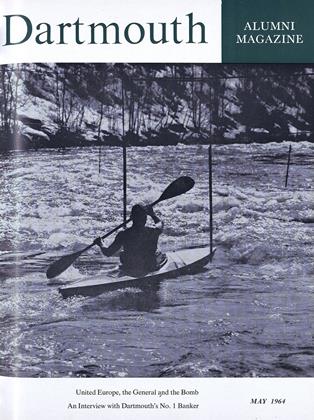By Arthur A.Ekirch Jr. '37. New York: The MacmillanCompany, 1963. 297 pp., notes and index.$5.95 (hardcover), $2.50 (paper).
Professor Ekirch set out to describe "both the idea and the practice of democracy for the entire sweep of American history." He provides us with a series of vignettes in intellectual history, a genre in which he is a master, and also a broad overview of political change in the United States. Appropriately enough, in a book dedicated to the memory of Charles Beard and Vernon Parrington, Professor Ekirch singles out basic changes in the economic order and in the role of America in world power relationships as the chief wellsprings of political change. Within this framework he considers the impact of individual theorists and popular mores.
The volume offers few surprises or new suggestions for the professional historian. Rather, it appears designed to provide serious, lively history for the informed lay reader, and in this respect it will serve well. All the subjects that are now standard are present here, from the politics of the colonial era through the Cold War. One major theme, pervading the book, is the classic dilemma of democratic theory: the conflict between the values of individualism and the pursuit of social goals (ranging from achievement of broadly-based material well-being to winning wars) by collective means. Another persistent theme is the American "sense of mission," which is also explored ably in recent studies by Hans Morgenthau and Frederick Merk.
The two themes have often impinged on one another in times of crisis. For example, during World War I pressure for conformity and unprecedented restriction of traditional liberties was justified by the need to "make the world safe for democracy." And since 1945 both the concern for internal security and the "missionary" quest for a solution to the conflict of democratic and totalitarian systems have created serious problems for those who would preserve older values. On these and related questions, the reader of The American Democratic Tradition will find much to ponder.
Assistant Professor of History
 View Full Issue
View Full Issue
More From This Issue
-
 Feature
FeatureUNITED EUROPE, THE GENERAL AND THE BOMB
May 1964 By HENRY W. EHRMANN, -
 Feature
FeatureDARTMOUTH'S NO. 1 BANKER
May 1964 By DERO A. SAUNDERS '35, -
 Feature
FeatureA New Strategy of Liberal Learning
May 1964 -
 Article
ArticleTHE UNDERGRADUATE CHAIR
May 1964 By DAVE BOLDT '63 -
 Class Notes
Class Notes1936
May 1964 By BARRY C. SULLIVAN, GILBERT BALKAM -
 Class Notes
Class Notes1922
May 1964 By LEONARD E. MORRISSEY, CARTER H. HOYT
HARRY N. SCHEIBER
Books
-
 Books
BooksAlumni Articles
JANUARY 1965 -
 Books
BooksTHAYER SCHOOL REPORT ALUMNI FUND, 1941
April 1942 By F. H. Munkelt '08 -
 Books
BooksTHE FEDERAL BULLDOZER – A CRITICAL ANALYSIS OF URBAN RENEWAL, 1949-1962.
FEBRUARY 1965 By FRANK SMALLWOOD '51 -
 Books
BooksGENERAL EDUCATION IN THE PROGRESSIVE COLLEGE,
November 1943 By Irving E. Bender. -
 Books
BooksTHEODORE SEDGWICK, FEDERALIST: A POLITICAL PORTRAIT.
JULY 1965 By JERE R. DANIELL II '55 -
 Books
BooksMethods and Standards for Local School Surveys
March 1919 By WALTER M. MAY



